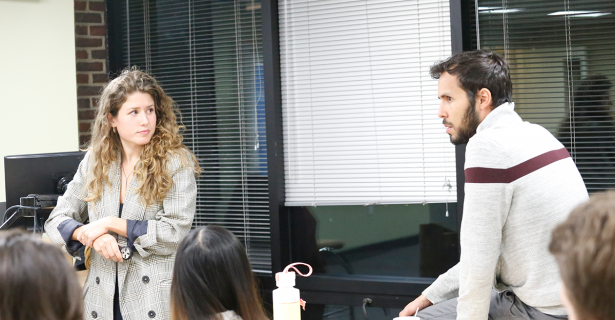What is going on in the mind of individuals in conflict settings? How does your brain respond to “others” who do not fit in to your social group? Conflict and fear are closely related, and they can be analyzed through a scientific lens. This is the intersection of cognitive science and social conflict that the NGO Beyond Conflict aims to understand. Tufts alumni, Michael Niconchuk (BUILD, A’11) and Elizabeth (Biz) Herman (EPIIC’08, Exposure, A’10) joined us for a discussion of their work with Beyond Conflict (formerly Peace and Justice in Times of Transition).
They spoke about how conflict affects your brain and body, your sense of self, and your community. They went on to explain how conflict often molds the cultural narratives of communities touched by violence around the world.
Mike Niconchuk is a Senior Researcher at Beyond Conflict and a former Emergency Response Coordinator at the Za’atri Refugee Camp in Jordan. Elizabeth Herman is a PHD Candidate in Political Science, University of California, Berkeley and an Innovation Fellow at the Innovation Lab for Neuroscience and Social Conflict, Beyond Conflict. They are both working at the Innovation Lab for Neuroscience and Social Conflict at Beyond Conflict where they generate and use new insights from brain and behavioral sciences to improve conflict mitigation and resolution programming.
Mike and Biz are taking an interdisciplinary approach to examining how the brain behaves. Not only do they conduct research, but they also utilize science-informed design and education sharing. For example, they are currently exploring the role of social endocrinology. This emerging field bridges behavioral endocrinology (the study of the interaction between hormones and behavior) with social and personality psychology. Integrating mental health into their study of conflict allows them to better understand and reconcile the different responses to traumatic experiences from a new perspective.
Their current work focuses on forced migration and post-traumatic stress disorder (PTSD) among refugees and displaced peoples. Their goal is to educate and increase access to self-care tools for people struggling with mental health and wellbeing. Understanding how these traumatic experiences manifest themselves mentally, emotionally and physically is key to designing specific self-care exercises.
Using this research, they are creating The Field Guide for Barefoot Psychologists, bringing science to those who need it most in vulnerable setting. In their words, “the Field Guide unpacks the biological and psychological processes associated with the experience of forced displacement, including issues such as trauma, toxic stress, guilt, shame, and hopelessness.” Each chapter starts with a story and ends with scientific explanation and self-care exercises.
According to Mike and Biz, the civilians caught in conflict often don’t have access to mental health care, therefore it is important to provide them with the necessary tools to understand and overcome the challenges of PTSD, enabling them to rebuild their lives. The Field Guide uses science to assist with post-conflict healing, because science is a right, and self -awareness is an asset.

